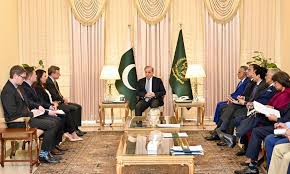Sherry Rehman calls for temporary Virtual Parliament

Islamabad: In a statement seeking the convening of parliament in extraordinary times like the current coronavirus emergency, PPP Parliamentary Leader in the Senate, Senator Sherry Rehman said, “Parliament’s urgent role of scrutinising government, authorising spending, making laws and providing leadership during these testing times cannot be pushed aside. The need of the hour is that the Parliament should adapt itself to extraordinary circumstances and ramp up e-tech capacity to temporarily.
shift towards a virtual parliament. These are very trying times for the whole country, and parliament is the best platform to shape unified responses that address the urgent needs of our people, while coordinating an evolving situation across Pakistan.” “There is clearly a huge resource-crunch hitting all sectors as lockdowns stretch on. It is a national challenge that requires regular messaging and creation of distancing spaces in a country with populations living in cramped spaces, where everything is done communally, including business, governance, prayer and schooling, among many other things.
Parliament must take the lead in working on all such issues creatively and transparently, in the spirit of national unity.
Many countries in the world are innovating fast to meet the needs of their populations while keeping them safe, and are creating online parliamentary spaces that can mobilise democratic tools to re-order many priorities. International aid coming into Pakistan must be monitored and placed under parliamentary sight. Essential committee meetings such as Health, Finance, Planning, IT, Interior, Law and others must be convened online to plan for contingent futures. The Committee on Health must start figuring out how we will provide for upcoming emergencies, protect our health professionals on the frontline, and get on with pooling our resources to fight this pandemic. None of this can be ignored and must be fast-tracked immediately by the custodians of both the Senate and the NA”, added the Senator.
Stressing on the importance of creating fresh protocols for parliament staff, the Senator said, “telework facilities can be organised for the Parliament staff as Senate staff runs at 1,115 people, while 2,200 NA staff including CDA officials are posted during sessions. They are extremely vulnerable to infection in cramped quarters due to low office space in parliament building. While essential committees can meet part virtually, part physically, transparency can be ensured by the live broadcast infrastructure which is already in place, easily tweaked by PTV”. “Like many parliaments that are stepping up to the challenge, Pakistan too can address key issues of security of votes, online debates as well as committee work which has already begun in one special committee made for Monitering COVID19 responses. In the region, Bhutan and Maldives are already doing this, while the UK, European, Brazilian,Spanish and many other Parliaments are either transitioned already to online work, or have announced plans to convene electronically if physical convening is not totally possible.
For making this operational in Pakistan, Article 67, which allows the Houses to make rules for regulating procedure and conduct of business can be studied, while Article 55 of the Constitution can be used and interpreted in the light of clear emergencies, as per international best practices. Highlighting different ways in which Parliament can be made virtual, the Senator said that “for web hosting large numbers, many Parliaments are turning to e-tech providers offering cloud-based solutions, including UK, Netherlands Senate, the Danish Folkinget, and Norway’s Stortinget. Bhutan is using G-Suite from Google Cloud, while CISCO web is already being used by Pakistan’s parliament. The Senate already circulates its papers in e-folders, and the Secretariat has taken authenticated signatures and addresses of Senators, so really the path forward to continuing work during this pandemic are clearly possible” “For democracy to be meaningful, its institutions must adapt to the future and to public needs in real time.
Pakistan’s economy is on ventilator, and little coordination is often visible. Every sector, quite literally needs adaptation ,as each province fights to test and treat cases while attempting to lower transmission rates of the virus. At the same time, our informal sector and daily wagers are in urgent need of social protection, while health professionals are in desperate need of equipment”, added the Senator. Senator Rehman appealed to the Senate Chairman and Speaker of the National Assembly to take this task into hand as Parliaments all over the world cannot be exempt from exploring urgent innovations to conduct crucial business.
Our task as representatives has become even more acute in times of crisis and legislators must continue to be answerable and available to the public”.





